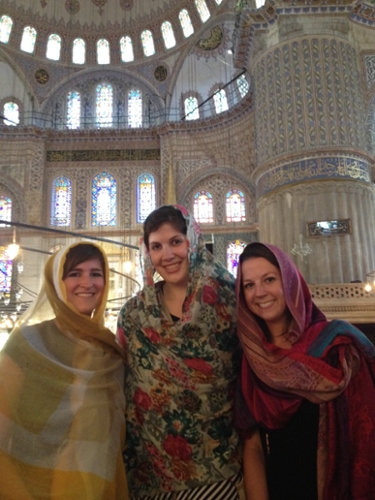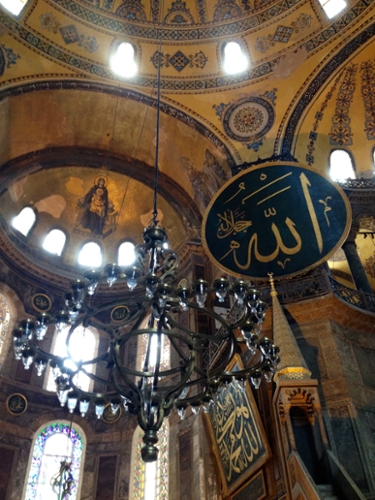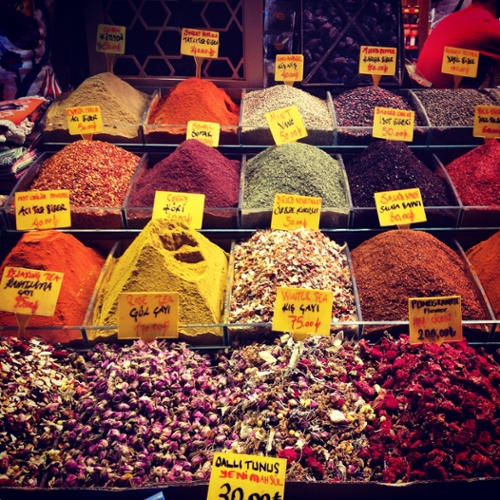The Integration Situation & Istanbul

Yesterday I went to another roundtable with two co-workers. This one was called "European Union Perspective in Kosovo 2010-2014: Survey of Awareness of the EU and European Integration Among Kosovo Residents." The European Union (EU) was launching results from a four-year survey about how Kosovars feel about integration with the EU.
EU integration is a big deal for Kosovo. Croatia was the most recent country to become an EU Member State, and all other non-EU Member States in the Balkans are working towards membership. Unfortunately, Kosovo hasn't even been approved for candidate status to the EU yet - instead, it is considered a "potential candidate." Essentially, Kosovo must make progress in several areas before it can even begin negotiations with the EU regarding membership. Beyond the organized crime and corruption that must effectively be fought before entering EU negotiations, Kosovo's candidacy status is further complicated by the fact that five EU Member States don't recognize it as a country.
The roundtable focused on Kosovar attitudes towards EU integration, and I'll share some of the most interesting results. There was a 5% drop in the number of respondents who believed that Kosovo would never join the EU from 7% in 2010 to a mere 2% in 2014. However, the number of respondents who believed that Kosovo would join the EU within the next two years also had a significant drop from 37% in 2010 to 18% in 2014. This seems to indicate that attitudes in Kosovo are becoming more neutral towards EU integration; respondents are becoming less inclined to believe that integration will happen very quickly or never at all.
The findings also showed perception differences amongst the two biggest ethnic groups in Kosovo, the Albanians and the Serbs. For instance, this year 93% of Albanian respondents answered that they would vote for membership if there were a referendum regarding Kosovo's EU membership tomorrow. Conversely, only 20% of the Serb population expressed that they would vote for EU membership if a referendum were held. However, the number of Serbs in Kosovo who would vote against EU membership in a referendum has decreased by 21% in the past two years. This data highlights the diverse views among the Albanians and Serbs regarding EU membership.

Another issue that puts Kosovo on different footing than other European countries is that it has no visa liberalization regime. When I studied abroad in the Czech Republic a few years ago, I marveled at how crossing country borders was like crossing state lines; in many cases there weren't even signs to mark the border crossings. The reason for that is the Czech Republic and 25 other EU Member States are part of the Schengen Agreement, which allows citizens of those countries to move freely between other Schengen countries with no visas or checks at the border. That isn't the case for Kosovo; if a Kosovar citizen wants to travel outside of the Balkans region, he or she must obtain a visa. This creates a myriad of problems. One Kosovar friend, for example, said he would never go through the hassle of obtaining a visa (take off work, make copies of his credit cards and bank statements, stand in line all day, pay the fee, etc.) for mere travel. So whereas I can visit my roommate in the Netherlands at the end of July with no problems, the process would be much more complicated for my Kosovar friends. Other interesting scenarios play out. For instance, earlier in the summer I met a Russian woman who was in Pristina visiting her Kosovar boyfriend. She talked about the strain the lack of visa liberalization puts on their relationship because he could never visit her in Russia; she always had to hop on a plane to visit him.
One paper I'm helping edit in the office argues that visa liberalization is more important to Kosovar citizens and the government than EU integration is. The paper also argues that the lack of visa liberalization gives Kosovar citizens an inferiority complex, since they do not have the freedom of movement that other Europeans have. My Dutch colleague disagrees with that argument, pointing out that Kosovars have the ability to travel to other countries; it just takes more effort. Either way, visa liberalization is a hot topic in Kosovo currently. Some guess that Kosovo will achieve visa liberalization as soon as the end of this year; others postulate that it will be much longer before it becomes a reality.
The roundtables, paper editing, and interactions with native Kosovars are giving me insight into Kosovo's political situation that I wouldn't otherwise have. I'm grateful for the opportunity to learn as much as possible.
Other highlights:
(1) World Cup watching:
Despite Tim Howard's glorious performance during the U.S. v. Belgium World Cup game last night, the U.S. was knocked out. But it was still fun to celebrate the U.S. with friends.

(2) Istanbul:
Although approximately 48 hours is definitely not long enough in Istanbul, Ambria, Erica, and I had a great time exploring such an incredible city. In our short time there we were able to visit the Blue Mosque, the Basilica Cistern, the Hagia Maria, the Topkapi Palace, watch a very stressful Brasil v. Chile World Cup game, walk through one of Istanbul's most vibrant shopping districts, go to the Archaeological Museum, haggle in the Spice Bazaar, and take a quick ferry ride to the Asian side. We fortunately met a friend in Istanbul who was a wonderful guide (we wouldn't have been able to do half of the things we did without him). My feet felt like they had fallen off of my body by the end of it, but Istanbul was worth it. I hope to go back one day so I can soak up more of such a vibrant city.




More adventures to come. Happy early 4th of July!